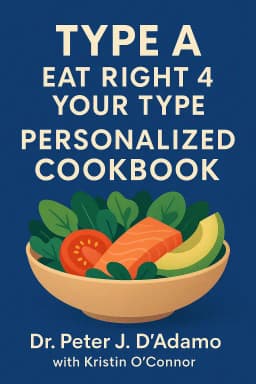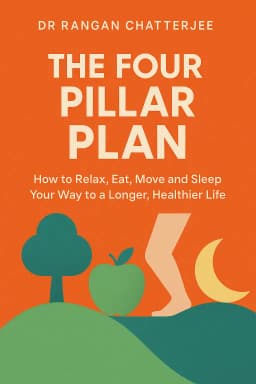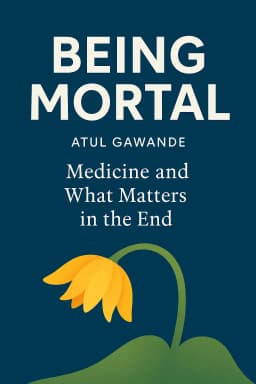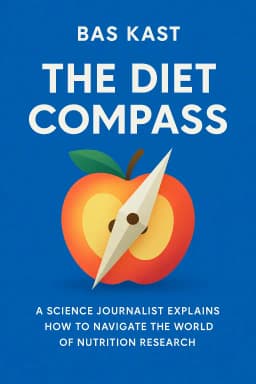
The Great Diet Deception
Golden Hook & Introduction
SECTION
Laura: The number one predictor of future weight gain isn't genetics or your lifestyle. It's having been on a diet in the first place. Sophia: Wait, hold on. That's the most depressing thing I've heard all week. You’re telling me that trying to lose weight is the best way to gain it? That feels like a cosmic joke. Laura: It sounds bleak, but it's actually incredibly liberating. It's the central idea in a book that has become a phenomenon, Fast. Feast. Repeat. by Gin Stephens. And what's so fascinating is that Stephens isn't a medical doctor or a celebrity nutritionist. She was an elementary school teacher who personally lost over 80 pounds and then built this massive grassroots movement online, all because she finally figured out why her own decades of dieting had failed her. Sophia: Okay, I'm intrigued. So this comes from real-world trial and error, not just a lab. If dieting is the problem, where do we even begin to fix it? Laura: We start by understanding the biological lie the entire industry is built on. Stephens calls it "The Dismal Truth About Diets," and it completely changes how you see your body.
The Great Diet Deception: Why 'Eat Less, Move More' Fails Us
SECTION
Laura: The fundamental problem with almost every diet is a concept called metabolic adaptation. Our bodies are ancient survival machines. They don't know we're trying to get ready for beach season; they think we're in a famine. So when you consistently eat less, your body does something terrifyingly efficient: it slows down your metabolism to conserve energy. Sophia: That sounds… permanent. Is it? Laura: It can be, and that's the scary part. There was a famous study on the contestants of the TV show "The Biggest Loser." They lost hundreds of pounds through extreme diet and exercise. But researchers followed up with them six years later. The results were devastating. Not only had most of them regained the weight, but their metabolisms had never recovered. Their bodies were burning hundreds of calories less per day than a person of the same size who had never dieted. Sophia: Oh, man. So their bodies were actively working against them. It's like you're trying to bail water out of a boat with a hole in it, and the harder you bail, the bigger the hole gets. Laura: That's a perfect analogy. And it gets worse. It's not just your metabolism. Your hormones go into a full-scale rebellion. Ghrelin, the "hunger hormone," skyrockets. You feel ravenous all the time. Meanwhile, leptin, the hormone that tells your brain you're full, plummets. So you're hungrier than ever and it takes more food to feel satisfied. Sophia: This is making me so angry on behalf of everyone who's ever counted a calorie. It feels like we've all been set up to fail. Laura: We have. And this isn't new information. The Minnesota Starvation Experiment back in 1944 showed the same thing. Men were put on about 1,800 calories a day—which many modern diets recommend—and they became obsessed with food, irritable, and their bodies went into crisis mode. This is why Gin Stephens' most powerful message in the whole book is a sentence in all caps: "YOU DID NOT FAIL DIETS. DIETS FAILED YOU." Sophia: Wow. I think I need to get that tattooed on my forehead. Okay, so if calorie restriction is a biological trap, what's the escape route? How do we get out of the boat? Laura: The escape route is to stop fighting your biology and start working with it. You have to change the signal you're sending your body. Instead of a constant, low-grade signal of "famine," you give it clear signals of "rest" and "plenty." And that begins with the absolute, non-negotiable core of her entire philosophy: the Clean Fast.
The Clean Fast: Your Body's 'On' Switch for Fat-Burning and Cellular Cleanup
SECTION
Laura: The goal of the fast isn't to starve yourself. It's to lower insulin. Insulin is the gatekeeper hormone. When insulin is high, your body is in fat-storing mode. When insulin is low, it's in fat-burning mode. The only way to get insulin to its baseline is to give your body a complete break from food. Sophia: Okay, "Clean Fast" sounds… clinical. And a little intimidating. What does it actually mean? I know I can have water. But what about my beloved flavored seltzer? Or a splash of almond milk in my morning coffee? Come on, it's like, five calories. Laura: And this is the most counterintuitive and crucial part of the entire book! It has almost nothing to do with calories. It's about the taste of sweetness or food-like flavors. Even zero-calorie sweeteners can trigger something called the Cephalic Phase Insulin Response. Your brain tastes sweetness and tells your pancreas, "Get ready, sugar is coming!" Insulin rises in anticipation of food that never arrives. This keeps you locked out of fat-burning mode. Sophia: You're kidding me. So my "harmless" diet soda is basically sending a hormonal signal to my body to 'get ready to store fat'? That is infuriating. Laura: It is! Gin Stephens tells her own story about this. For years, she was fasting but still drinking diet sodas and using creamer. She was stuck. The moment she switched to a true clean fast—only black coffee, plain tea, and plain water—the weight started melting off. It was the key that unlocked everything. Sophia: That's a huge revelation. It reframes the fast completely. It’s not about willpower against hunger, but about keeping your hormones quiet. What about the other benefits? You mentioned something called 'autophagy'? It sounds like a sci-fi movie. Laura: It's as close to sci-fi as our bodies get! Autophagy is your body's cellular recycling program. During a clean fast, your body goes into housekeeping mode. It seeks out old, damaged, junky cells and proteins and breaks them down for fuel or to build new, healthy cells. It's deep cleaning on a microscopic level. Sophia: That’s incredible. Is there any visible effect of that? Laura: Well, anecdotally, many people in the intermittent fasting community, including the well-known Dr. Jason Fung, theorize that this is why people who lose a lot of weight through fasting often have less of an issue with loose skin. The body literally 'eats' the old, excess tissue through autophagy. It's turning trash into treasure. Sophia: Okay, my mind is officially blown. So you fast clean to burn fat and literally recycle your body parts. What happens when the fast is over? How do you not just undo all that good work? Laura: Ah, that's where we move from the 'Fast' to the 'Feast' and the 'Repeat'. And it's where you have to unlearn everything diet culture has ever taught you.
Beyond the Fast: The Art of the Feast and the 'No Wagon' Lifestyle
SECTION
Laura: Once you've mastered the fast, you have to master the feast. And this is not about eating perfectly clean salads and grilled chicken for the rest of your life. Gin Stephens' core mantra for the eating window is "Delay, Don't Deny." Sophia: I love the sound of that. But let's be real. Doesn't "Don't Deny" just become a permission slip to eat an entire pizza every night? That feels like a recipe for disaster. Laura: That's the 'diet brain' talking! We're so conditioned to think in terms of restriction and cheating. Stephens makes this brilliant distinction. There's a huge difference between "You can eat whatever YOU want" and "EAT WHATEVER YOU WANT!" Sophia: Okay, break that down for me. It sounds like the same thing. Laura: "EAT WHATEVER YOU WANT" is the college freshman in the cafeteria with a meal plan for the first time. It's a free-for-all that leads to the "Freshman 15." But "You can eat whatever YOU want" is about empowerment and listening to your body. It means if you truly want a piece of cake, you can have it, enjoy it without guilt, and move on. The ultimate goal is what she calls 'Appetite Correction.' Sophia: Appetite Correction. So, retraining your body to know what it actually wants? Laura: Exactly. It's about reconnecting with your body's true hunger and satiety signals, which get completely scrambled by decades of dieting and eating processed foods. You start to recognize the subtle "sigh of satisfaction" that means you're full. You learn that some foods, like a big steak and a baked potato, keep you satisfied for hours, while a bag of chips leaves you hungry an hour later. You become your own food scientist. Sophia: That makes sense. It's about becoming that person who can leave half a piece of cake on the plate because they're actually full, not because a diet app told them to. But what about real life? Vacations, holidays, a friend's birthday... that's where every diet I've ever known completely falls apart. You fall off the wagon. Laura: And this is the final, most powerful mindset shift in the entire book. With intermittent fasting as a lifestyle, there is no wagon. Sophia: Come on. There's always a wagon. Laura: There isn't! A diet is a set of restrictive rules. When you break a rule, you've failed, you're "off the wagon," and you might as well eat the whole box of cookies. But intermittent fasting is a pattern, a rhythm. If you're on vacation and you decide to have breakfast with your family, you haven't failed. You've just chosen a longer eating window for that day. Tomorrow, you go back to your normal pattern. There's no guilt, no failure, no wagon to fall off of. It's just life.
Synthesis & Takeaways
SECTION
Sophia: So, when you put it all together, it seems like the book's real message is that we've been fighting the wrong battle. We've been fighting our own willpower, when we should have been working with our biology. Laura: Exactly. It's about shifting from a mindset of restriction to a mindset of rhythm. Fasting isn't about deprivation; it's about giving your body the rest it needs to heal and access its own fuel. The average American eats across a 15-hour window every day, never giving their insulin levels a chance to drop. This lifestyle just restores a natural, ancient human pattern of fasting and feasting. Sophia: It really reframes everything. It’s not about what you can’t have, but about the incredible power and health benefits you gain when you choose to fast. That's a much more empowering way to think about it. Laura: It is. And as Gin Stephens says, "The magic happens in the clean fast!" So for anyone listening who feels stuck in that endless diet cycle, maybe the first step isn't a new meal plan or a new workout. Maybe it's just a cup of black coffee tomorrow morning, and seeing what happens. Sophia: I'm feeling inspired. And maybe a little thirsty for some plain, unflavored sparkling water. Laura: This is Aibrary, signing off.









